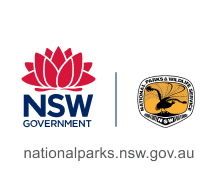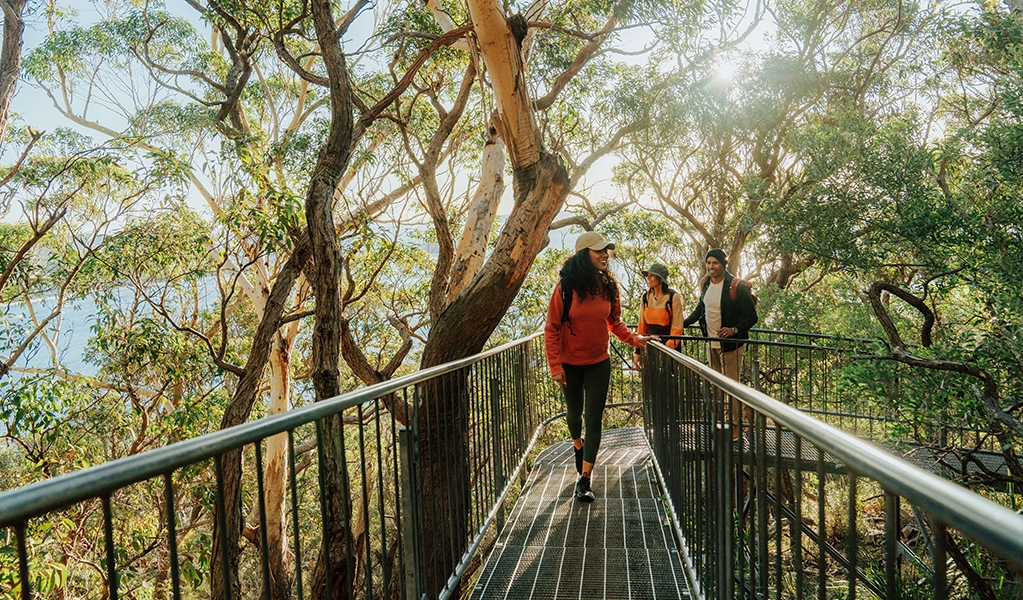Tomaree National Park
Overview
Tomaree National Park near Port Stephens is on Worimi Country. It's a great place for a weekend getaway. With so many coastal lookouts it's easy to go whale watching, hike the tracks, or explore the historical significance of Fort Tomaree.
Read more about Tomaree National Park
Tomaree National Park provides a magnificent backdrop to the coastal villages of Nelson Bay, Shoal Bay, Fingal Bay, One Mile, Boat Harbour and Anna Bay. With 27km of connected hiking Tomaree Coastal Walk offers you a taste of everything in this surprisingly diverse park.
It’s the only place in NSW where you can see outcrops of the acid volcanic rock rhyodacite. The national park also borders the largest marine park in the state as well as the largest moving coastal sand dune in the southern hemisphere at nearby Worimi Conservation Lands. The Worimi connection to Country is strong and you can learn more about this at Birubi Point Aboriginal Place.
It’s an excellent spot for whale watching and offers a range of scenic walks, including the short Wreck Beach walk through coastal angophora forest and the longer Morna Point walk that comes alive with spring wildflowers. As you walk, look for sea eagles in the sky, koalas dozing high in the trees, and echidnas on the ground.
The park’s beaches are pretty places for a family barbecue and there are picnic facilities around Anna Bay, Fingal Bay, and Fishermans Bay. Enjoy a swim or snorkel at the beaches patrolled by lifeguards including One Mile Beach, Fingal Bay Beach, or Birubi Beach. Although there are some good places for fishing you’ll need to check the marine park zoning before setting out.
However you choose to spend your time in Tomaree National Park, make sure you hike Tomaree Head Summit. It’s steep but short and you’ll be rewarded with panoramic ocean views over Port Stephens, and Broughton, Cabbage Tree and Boondelbah Islands nature reserves. While you’re there, check out the historic gun emplacements, part of Fort Tomaree and built in 1941 as part of Australia’s World War II east coast defence system.
Local alerts
For the latest updates on fires, closures and other alerts in this area, see https://www.nationalparks.nsw.gov.au/visit-a-park/parks/tomaree-national-park/local-alerts
Map
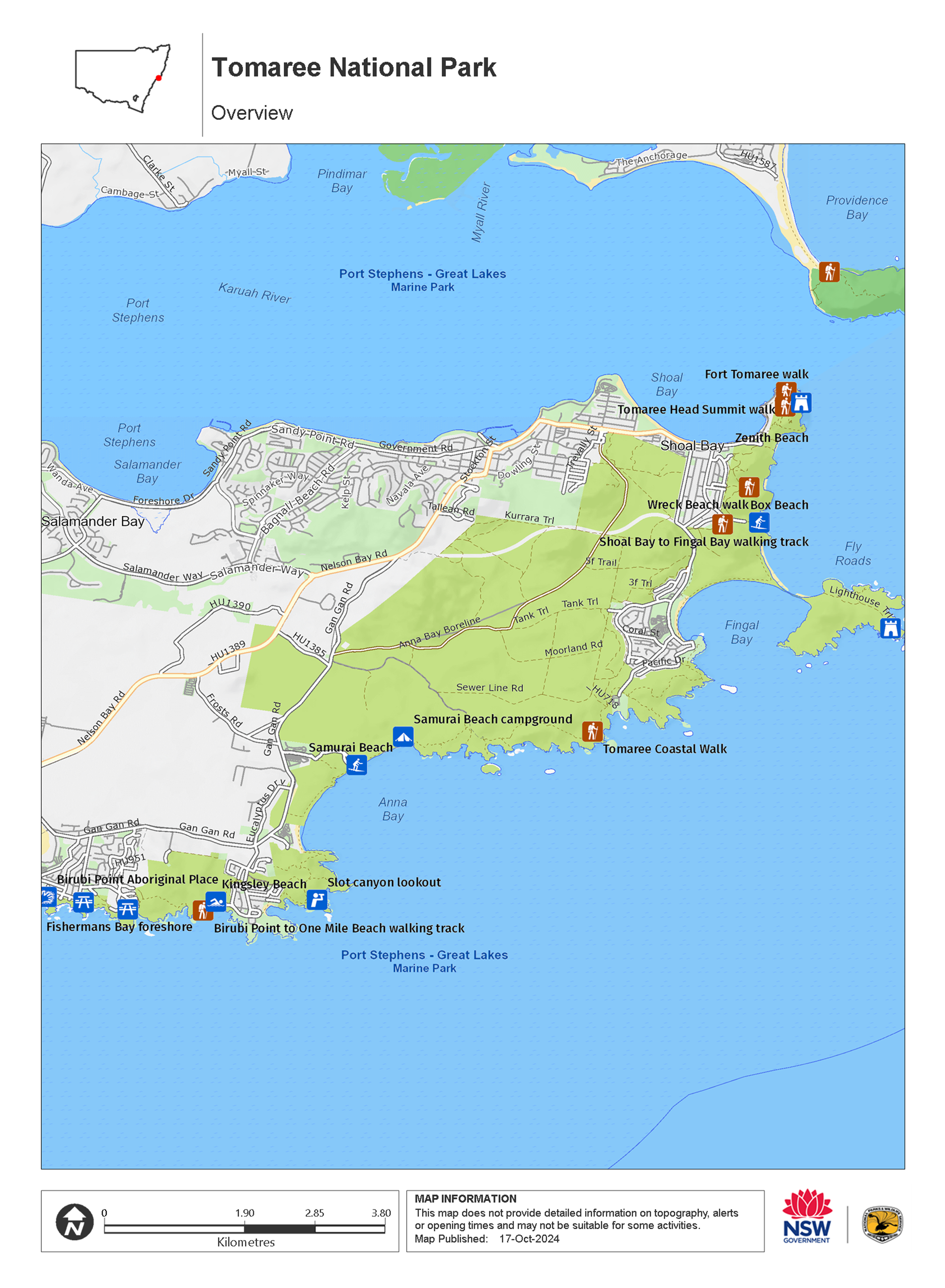
Map legend
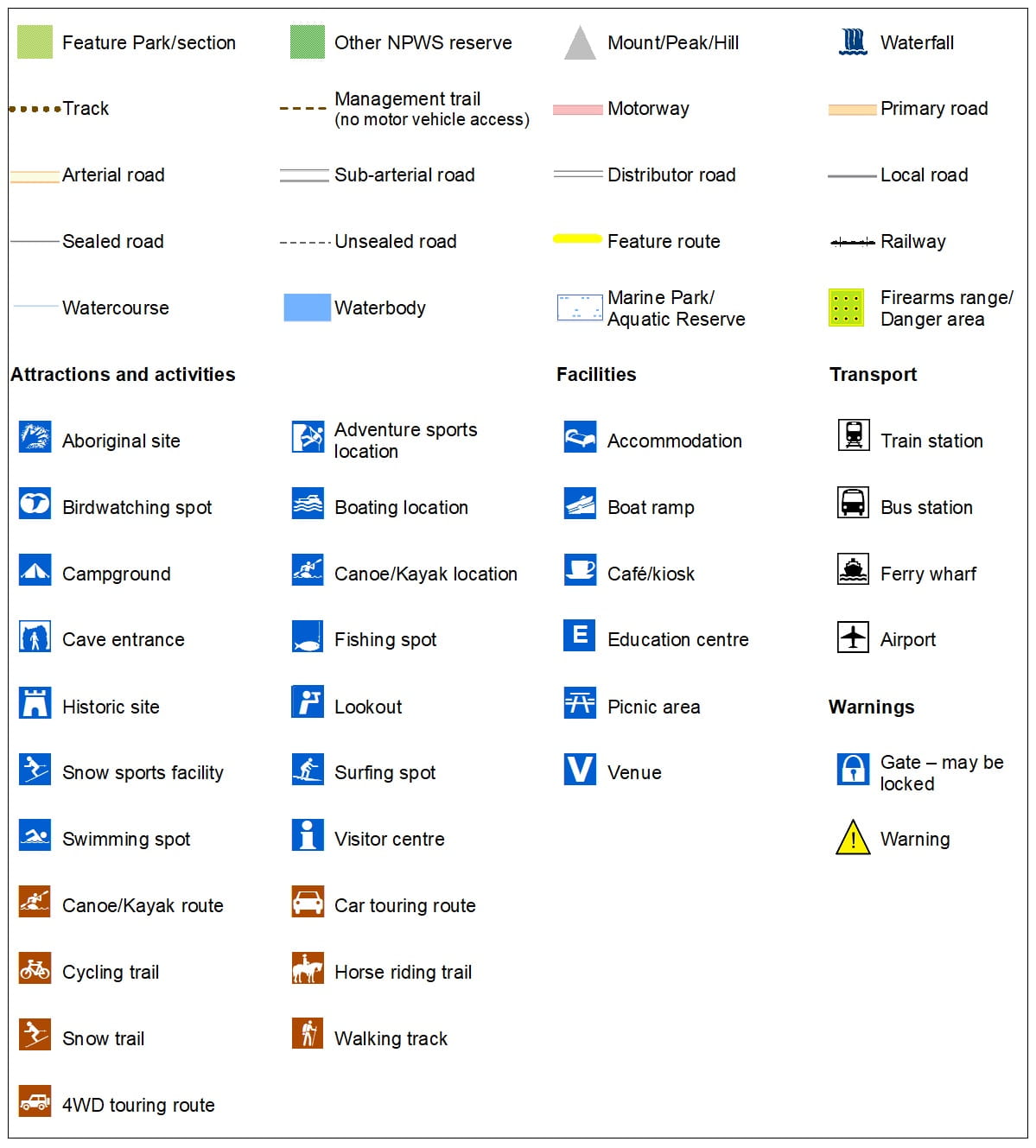
Contact
- in the North Coast region
Tomaree National Park is always open but may have to close at times due to poor weather or fire danger.
-
-
Anna Bay office
02 4984 8200
Contact hours: Monday to Friday, 8.30am to 4.30pm. - 4154 Nelson Bay Road, Anna Bay, NSW 2315
-
Email: npws.huntercoast@environment.nsw.gov.au
-
Anna Bay office
Visitor info
All the practical information you need to know about Tomaree National Park.
Maps and downloads
Nearby towns
Nelson Bay (4 km)
Nelson Bay is a major holiday playground and the main resort area of Port Stephens. It's located on the southern shores of Port Stephens.
Newcastle (55 km)
Newcastle is a harbour city surrounded by amazing surf beaches that are linked by a great coastal walk, the Bathers Way. The walk from Nobbys Beach to Merewether Beach takes about three hours and is a great way to explore the city.
Bulahdelah (96 km)
Buladelah is the gateway to Myall Lakes National Park. It's situated on the Myall River, with a backdrop of soaring, forested hills.
Learn more
Tomaree National Park is a special place. Here are just some of the reasons why:
Birdlife and koala country

The park's beaches and rocks support sooty oystercatchers and the swamps support active populations of wallum froglet populations of migratory shore birds including the eastern curlew and red-necked stint. See if you can spot the passing bar-tailed godwit - this long-beaked bird holds the record for the longest non-stop flight; 11,000km without a break. Visit in winter to see colourful lorikeets and honeyeaters feeding on wildflowers in the coastal heathland and in summer you'll see migratory tropical species including cuckoos and rainforest pigeons. Look close at the surrounding shoreline and you may find green turtles and dugongs. Tomaree National Park also offers the opportunity to see one of Australia's iconic animals up close. See koalas feasting on swamp mahogany in and around the park, or in the trees around One Mile Beach carpark.
- Fingal Island eco-walk and lighthouse tour Discover the captivating history of Point Stephens Lighthouse and Fingal Island on this tour with Aquamarine Adventures. Take in the incredible views and immerse yourself in this magical landscape in Tomaree National Park, near Nelson Bay.
- Junior ranger: Tomaree coastal adventure tour Be guided by a NPWS Discovery ranger on this bush to beach adventure in Tomaree National Park.
- Ocean rockpool nature tour: Tomaree Discover the amazing world of rockpools along the rocky shores of Fishermans Bay on the Tomaree National Park coastline. See what you can find below the surface, not far from Nelson Bay.
- The Earth's environment Join The Earth's environment Geography excursion for Stage 2 (Years 3-4) students at Tomaree National Park, near Port Stephens. They'll discover how NSW National Parks safeguards over 10 per cent of land in NSW.
- Tomaree 4WD tag-along and passenger tours Explore the fabulous sand dunes of Tomaree National Park safely with experienced guides from 4WD Tag-Along and Passenger Tours, near Nelson Bay and Port Stephens.
Aboriginal heritage

Tomaree National Park is the traditional land of Worimi People and provided a range of resources, including food, medicines and shelter. The ancient landscape of the park is part of the cultural knowledge and 'Dreaming' stories of the Worimi People and remains an important Aboriginal place today. The south end of the park includes Birubi Point, a declared Aboriginal Place. A walk along the beaches of Tomaree National Park are a walk along ancient travel routes used by Worimi to travel north and south through their Country.
- Aboriginal culture Bring your students to this unique excursion in Tomaree National Park, near Port Stephens. They’ll experience the park through the eyes of an Aboriginal person on this Stage 2 (Years 3-4) Aboriginal culture Geography excursion.
- Birubi Point Aboriginal Place Learn more about the culture of the Worimi People at Birubi Point Aboriginal Place in Tomaree National Park, near Anna Bay. Hear Worimi artist, Gerard Black, discuss his artwork titled Matjarr nguka biinba.
- Birubi Point to One Mile Beach walking track This 7.5 km one-way walk from Birubi Point to One Mile Beach offers ocean views and Aboriginal culture. Located in Tomaree National Park near Port Stephens, it winds through several coastal villages with convenient facilities.
- Birubi storytelling: Matjarr nguka biinba A place of significance for Worimi People, Birubi Point is a declared Aboriginal Place. Listen to Worimi artist Gerard Black describing the meaning in his artwork through our video and audio stories.
- Junior ranger: Tomaree coastal adventure tour Be guided by a NPWS Discovery ranger on this bush to beach adventure in Tomaree National Park.
Ancient landscape

The northern section of Tomaree National Park has 4 peaks, the largest being Tomaree Head at 162m high. Overall, the landscape is the residual surface of a peneplain uplifted during the tertiary period (65 to 1.8 million years ago) and subsequently eroded, leaving the more resistant volcanic rocks as small hills. Port Stephens is a flooded river valley. The western sections of the park are sand deposits of fluvial and estuarine origin.
- Embrace Tomaree women's guided coastal walk Join Women Embrace Adventure on a multi-day hiking getaway on the Tomaree Coastal Walk in beautiful Port Stephens, near Newcastle. This tour is all inclusive, so you don’t need to worry about a thing.
- Junior ranger: Tomaree coastal adventure tour Be guided by a NPWS Discovery ranger on this bush to beach adventure in Tomaree National Park.
- Ocean rockpool nature tour: Tomaree Discover the amazing world of rockpools along the rocky shores of Fishermans Bay on the Tomaree National Park coastline. See what you can find below the surface, not far from Nelson Bay.
- Surf lessons in Tomaree National Park Feel the thrill of riding waves at some of Australia’s most beautiful beaches on a surfing tour with Mojosurf in Tomaree National Park.
- Tomaree 4WD tag-along and passenger tours Explore the fabulous sand dunes of Tomaree National Park safely with experienced guides from 4WD Tag-Along and Passenger Tours, near Nelson Bay and Port Stephens.
Military history

Follow in the footsteps of Australian soldiers on the trail to Tomaree Head. The historic Fort Tomaree played an important role in the defence of Port Stephens during World War II, including Tomaree Head that was solidly armed with gun emplacements. You can take a guided Discovery tour of the gun emplacements to find out more about this historic site.
- Fingal Island eco-walk and lighthouse tour Discover the captivating history of Point Stephens Lighthouse and Fingal Island on this tour with Aquamarine Adventures. Take in the incredible views and immerse yourself in this magical landscape in Tomaree National Park, near Nelson Bay.
- Fort Tomaree walk Fort Tomaree walk is an easy walk that runs just below Tomaree Head Summit walk and takes you to the World War II gun emplacements, used in the defence of east coast Australia during World War II.
- Point Stephens Lighthouse and Fingal Island Take a boat or a tour to Fingal Island and explore Point Stephens Lighthouse and historic ruins. Aquamarine Adventure run regular tours to Fingal Island. It's not safe to walk across the sand spit to the island as the tide and swell can change quickly.
- World War II gun emplacements Discover the military history of Port Stephens on a guided tour of the historic gun emplacements at Tomaree Head in Tomaree National Park on the north coast of NSW.
Plants and animals protected in this park
Animals
-

Koala (Phascolarctos cinereus)
One of the most renowned Australian animals, the tree-dwelling marsupial koala can be found in gum tree forests and woodlands across eastern NSW, Victoria and Queensland, as well as in isolated regions in South Australia. With a vice-like grip, this perhaps most iconic but endangered Australian animal lives in tall eucalypts within a home range of several hectares.
-
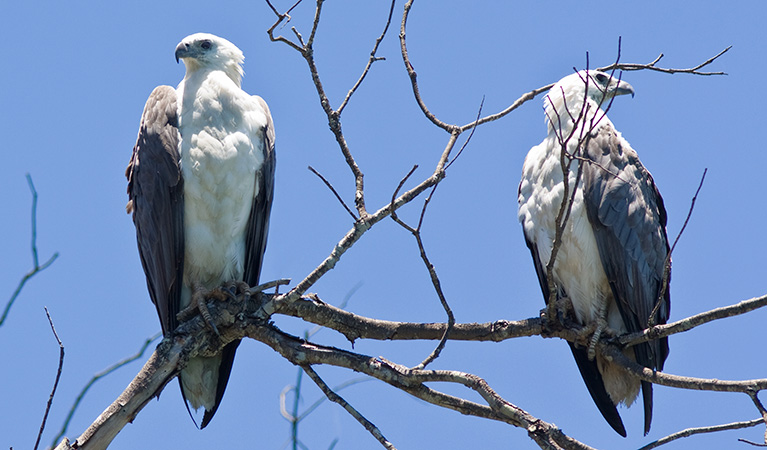
White-bellied sea eagle (Haliaeetus leucogaster)
White-bellied sea eagles can be easily identified by their white tail and dark grey wings. These raptors are often spotted cruising the coastal breezes throughout Australia, and make for some scenic bird watching. Powerful Australian birds of prey, they are known to mate for life, and return each year to the same nest to breed.
Plants
-

Old man banksia (Banksia serrata)
Hardy Australian native plants, old man banksias can be found along the coast, and in the dry sclerophyll forests and sandstone mountain ranges of NSW. With roughened bark and gnarled limbs, they produce a distinctive cylindrical yellow-green banksia flower which blossoms from summer to early autumn.
-

Smooth-barked apple (Angophora costata)
Smooth-barked apple gums, also known as Sydney red gum or rusty gum trees, are Australian native plants found along the NSW coast, and in the Sydney basin and parts of Queensland. Growing to heights of 15-30m, the russet-coloured angophoras shed their bark in spring to reveal spectacular new salmon-coloured bark.
-

Grass tree (Xanthorrea spp.)
An iconic part of the Australian landscape, the grass tree is widespread across eastern NSW. These Australian native plants have a thick fire-blackened trunk and long spiked leaves. They are found in heath and open forests across eastern NSW. The grass tree grows 1-5m in height and produces striking white-flowered spikes which grow up to 1m long.
Environments in this park
Education resources (1)
School excursions (3)
- Coastal and catchment management, Stage 5 (Years 9-10), Geography
- Aboriginal culture, Stage 2 (Years 3-4), Geography
- The Earth's environment, Stage 2 (Years 3-4), Geography
What we're doing
Tomaree National Park has management strategies in place to protect and conserve the values of this park. View the detailed park and fire management documents. Here is just some of the work we’re doing to conserve these values:
Managing weeds, pest animals and other threats
Pests and weeds have a significant impact to the ecosystems within Tomaree National Park. NPWS carries out risk assessments for new and emerging weeds as well as Bitou bush, lantana and other weeds with relatively minor distribution that require control programs to protect biodiversity in this park.
Historic heritage in our parks and reserves
Tomaree National Park is both historic and scenic, and heritage sites within the park receive ongoing maintenance, upgrading and conservation work. NPWS undertakes the routine upkeep and upgrading of its visitor facilities.
Developing visitor facilities and experiences
Tomaree National Park promotes a safe and positive experience for all its visitors, and works to provide top-quality facilities and equipment. To ensure optimal comfort and enjoyment, park facilities receive regular upkeep. Recreation areas are well maintained with minimal impact on the park's natural and cultural values.
Conserving our Aboriginal culture
NPWS works alongside the Worimi Local Aboriginal Land Council and the local Aboriginal community in documenting and protecting the cultural heritage in Tomaree National Park. Culturally significant items, sites and places within the park are assessed, protected and conserved for future generations. Heritage maintenance and conservation programs are ongoing, and human impact is minimised where possible.
Managing fire
NSW is one of the most bushfire prone areas in the world as a result of our climate, weather systems, vegetation and the rugged terrain. NPWS is committed to maintaining natural and cultural heritage values and minimising the likelihood and impact of bushfires via a strategic program of fire research, fire planning, hazard reduction, highly trained rapid response firefighting crews and community alerts.
